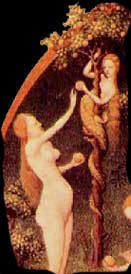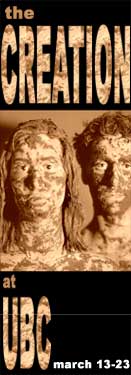|

Stephen Drover (Drove) is at his final leg of the MFA
Directing program and The Creation, his thesis production,
marks the culmination of the two years of work.
Before coming to UBC, he assisted at
Neptune Theatre and the Atlantic Theatre Festival, directed
independently with Bare Boards Theatre and No Strings Theatre,
and was Associate Director for Theatre Newfoundland Labrador
in his home province (which he misses dearly).
Some of his favorite projects have
been Romeo & Juliet, Of the Fields Lately
(TNL), A Midsummer Night's Dream (Acting Up Entertainment),
Woody, See Bob Run (Bare Boards Theatre), and The
Bond (UBC).
His interests lie primarily in how
theatre relates to myth and ritual, both throughout theatre
history and today, and how theatre might serve a social/ moral/
spiritual function above being public entertainment.
Thanks to a great team for their hard work, The Heat for his
advice and guidance, and Peter for his constant prodding.

Notes from Stephen Drover
Director, The Creation
"The medieval era was a very vibrant time for theatre:
the lyrical epic stories of the Barbarian tribes, mimes andminstrels
who traveled the countryside, the Terence-based comedies of
Hrotsvitha, and morality plays such  as
Everyman. But there was a greater force to be reckoned with.
When the Latin-based Catholic liturgical drama broke free
of the church building and found an unlikely mate in the popular
religious vernacular plays being done in the streets, there
evolved a theatrical phenomenon the likes of which we have
never seen since: the mystery cycles. as
Everyman. But there was a greater force to be reckoned with.
When the Latin-based Catholic liturgical drama broke free
of the church building and found an unlikely mate in the popular
religious vernacular plays being done in the streets, there
evolved a theatrical phenomenon the likes of which we have
never seen since: the mystery cycles.
The European mystery plays
were used to instruct and entertain the illiterate masses
on Biblical stories and Catholicism and were huge events that
spanned days and incorporated the entire community in the
production and performance of the usual cycles of "The
Creation", "The Passion" (the life of Christ),
and "Doomsday" (the apocalypse).
In 1996, with the aim
of exploring the mystery plays and their relevance to contemporary
culture and society, Edward Kemp and Katie Mitchell of the
Royal Shakespeare Company set about producing one of the cycles,
initially the mystery plays of York. Finding the original
plays very problematic (they tend to be steeped in Catholic
dogma, misogyny, and at times anti-Semitism) they instead
chose to create a 'new version' taking as sources the original
cycles plus the Bible, the apocrypha, and the Koran. The result
was two parts of a complete cycle, The Creation and The Passion,
both of which successfully retained a medieval form and language
structure, but also addressed contemporary sensibilities,
making the Judeo-Christian (and partly Islamic) creation myth
an immediate and relevant story.
This is a very simple
story: that of God, the creation he calls "man",
and their struggle to understand one another. It's also a
very important story: the myth of creation as shared by millions
and millions of people worldwide. It was this simplicity and
importance that I found terribly exciting, both theatrically
and spiritually. Why are we here? What is "God"
like? What does he want of us? How should we behave? It's
difficult to ask these questions today without natural, cynical,
theophobic dismissals. But at the end of the day these are
the big questions and the very ones that lie at the origins
of theatre. I do not know if a play can answer any of them.
But they're healthy questions to ask."
Stephen Drover
Director
|
